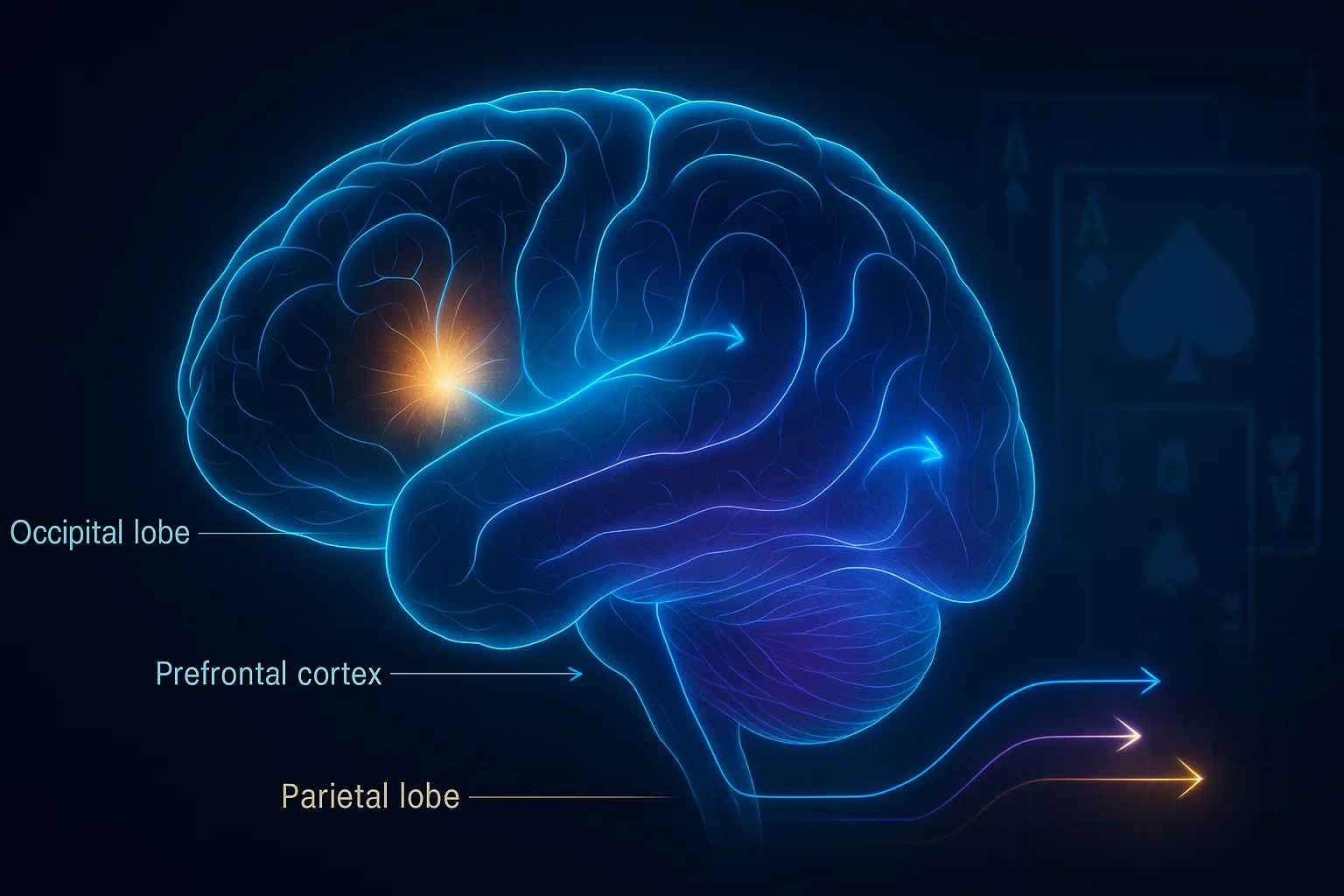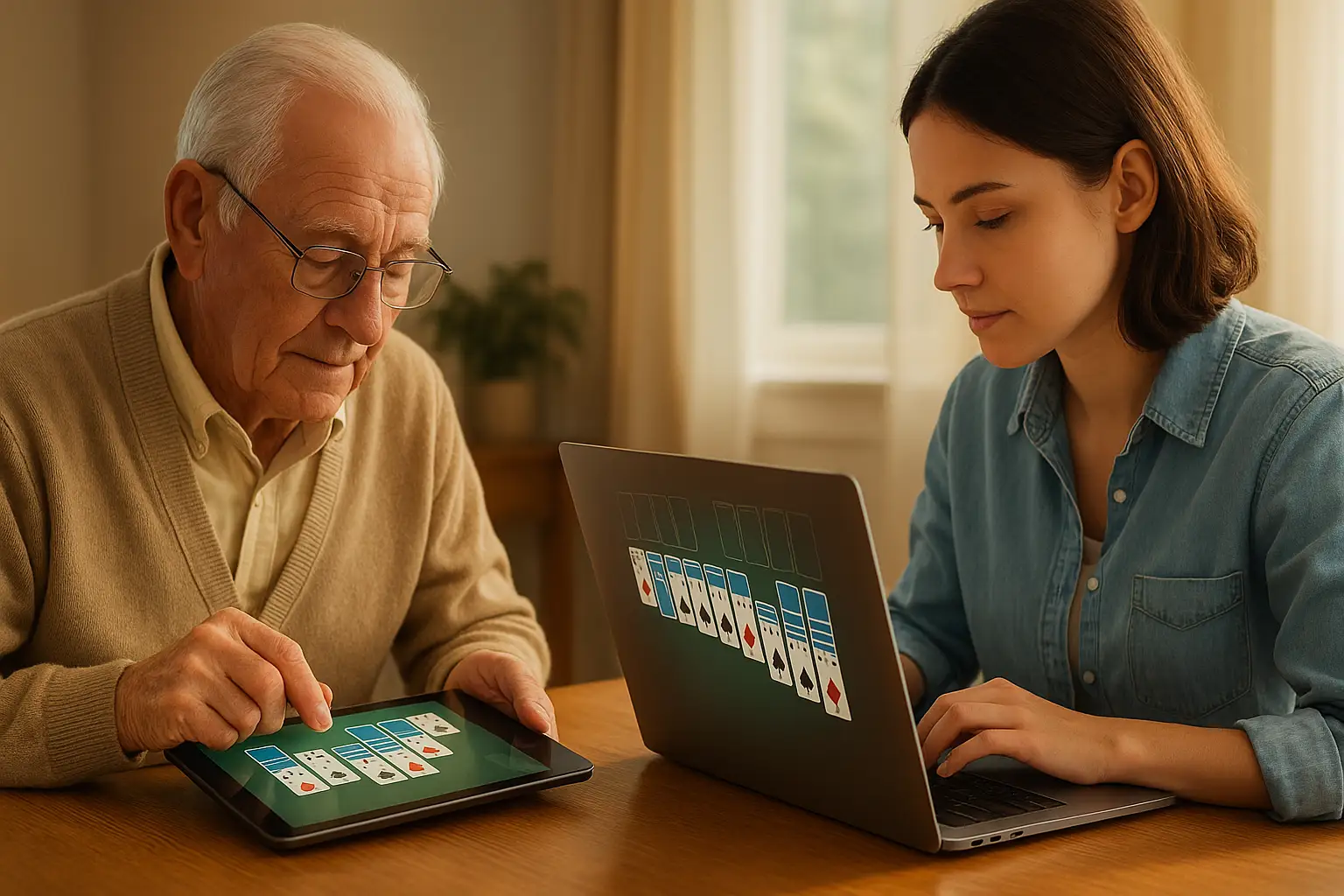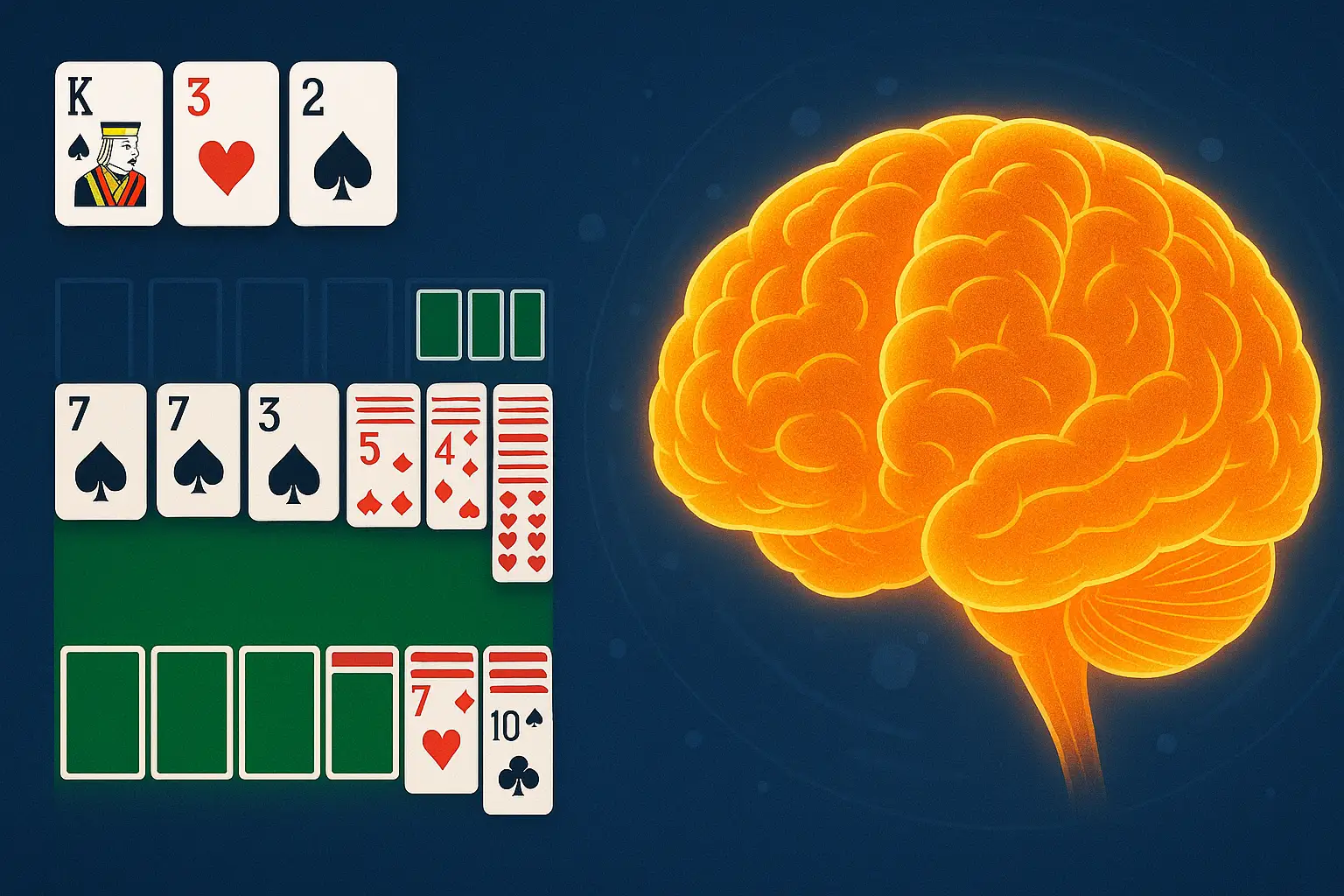Most people play Solitaire to relax or fill a few quiet minutes. It feels simple. Just cards, moves, and luck. But here’s something interesting: every time you play, your brain is quietly working behind the scenes. It sorts patterns, remembers past moves, and plans ahead, making you wonder is Solitaire good for your brain or just fun.
Recent studies in 2025 suggest that small games like Solitaire can actually help with focus and memory. They make your mind practice short-term thinking and quick decisions. Some experts in cognitive psychology even compare it to light mental exercise, the kind that keeps your brain flexible with age.
Think about it. When you play, you’re not only passing time. You’re teaching your mind to stay calm, think clearly, and solve problems. In this article, we’ll look at what science says about Solitaire and brain health, the real benefits, and where the myths stop. It’s time to see how a quiet card game might be giving your mind more power than you ever guessed.
The Science Behind How Solitaire Stimulates the Brain
Playing Solitaire looks simple, but your brain works hard in the background. Every move you make triggers memory, focus, and logic. These small actions push your mind to plan, predict, and correct mistakes, the same processes your brain uses in real-life decisions.
Scientists explain that games like Solitaire light up areas inside the prefrontal cortex, the part that handles decision-making and self-control. When you decide where to move a card, your brain is practicing attention control and mental flexibility. This is why Solitaire is more than a quiet card game. It’s an invisible workout for your executive functions, keeping your mind active while you play.
Cognitive Functions Triggered While Playing Solitaire
When you play, your mind performs multiple tasks together. It is not just clicking cards; it’s running small cognitive drills.
- Working memory stores what cards are hidden or already used.
- Attention control helps you avoid distractions and focus on the next move.
- Decision-making helps you plan the safest or smartest option.
- Pattern recognition trains your brain to identify sequences and colors faster.
Each of these actions activates both logic and creative sides of your brain, keeping your neural pathways strong. Over time, these small exercises improve how quickly you think, plan, and react.

Neuroplasticity and Mental Agility Through Repetition
Every time you play Solitaire, your brain repeats problem-solving patterns. This repetition supports neuroplasticity, which means your brain’s ability to grow and rewire itself. The more you practice, the more connections your brain builds between memory and logic areas.
This process helps with:
- Long-term memory: remembering game layouts and strategies
- Mental agility: switching between moves faster over time
- Focus retention: staying calm and alert through the whole session
Think of it as mental gym training. The more you play with attention, the better your brain gets at staying flexible, calm, and sharp.
Related Blog: The Truth About Solitaire: Can Every Game Be Won?
Proven Cognitive Benefits of Playing Solitaire
Solitaire might look calm and simple, yet it gives your brain a surprising number of benefits. Every round is a small lesson in focus, patience, and mental control. Scientists and psychologists who study cognitive training agree that light mental activities, when done regularly, can keep the mind sharp and flexible. Solitaire works the same way, building attention and logic through steady practice.
Boosts Memory, Focus, and Concentration
Research on memory games and mental exercise shows that games involving planning and short-term tracking improve concentration. A study from the National Institutes of Health (NIH) found that repeated card sorting tasks help people strengthen their working memory and maintain focus longer.
Dr. Karen Hughes, a cognitive psychologist, once said, “Games that ask the brain to plan and recall steps in sequence act like stretching before a workout. They prepare your mind to think faster and remember better.”
When you play Solitaire, your brain constantly stores what card came before and what move to plan next. That back-and-forth pattern is a mini version of cognitive training. Over time, you may notice faster thinking and better memory even in daily life.
Improves Patience, Logic, and Problem-Solving Skills
Every move in Solitaire tests your executive function, which is your brain’s way of managing time, control, and logical thought. You often wait for the right card, hold back a risky move, and think ahead two or three steps. That process strengthens delayed gratification and logical reasoning.
Unlike quick-click mobile games, Solitaire rewards calm strategy. It teaches discipline by making you wait and think. In this way, it works much like other logic-based games such as Chess or Sudoku, where each choice shapes the next few moves. That’s why psychologists often recommend these games as brain training tools for both kids and adults.
Reduces Stress and Promotes Mindful Thinking
While your brain works, your body relaxes. Studies on stress relief show that simple, repetitive activities like Solitaire can help regulate dopamine balance, which affects mood and calmness. The game’s rhythm helps slow breathing and reduce tension, turning focus into a form of light mindfulness.
Many players describe Solitaire as a “mental reset.” You zone in on the cards, forget outside stress, and create a calm space where your mind can rest without going blank. This small pocket of peace can improve mental clarity and restore focus after long, busy hours.
Real Studies: The Evidence and the Myths
Every bold claim need proof. To understand if Solitaire truly strengthens the brain, we turn to real scientific research. Over the past few years, several studies have tested how small, strategic games affect cognitive performance and mental health. The results show clear benefits, but they also reveal limits that most players never think about.
Scientific Research That Supports Solitaire’s Mental Benefits
Researchers have been studying how light strategy games like Solitaire affect the mind for more than a decade. While not every test is about Solitaire alone, many card-based and logic-based experiments offer similar results.
- NIH Cognitive Game Study (2023)
A group of adults played digital card games for 20 minutes a day over six weeks. Their scores on working memory enhancement tests improved by 18%. Participants also reported feeling calmer and more focused during daily tasks. - University of Toronto Digital Cognitive Test (2024)
This research compared puzzle games and Solitaire-style apps. Players showed faster decision-making and better pattern recall than non-players. The study linked gameplay repetition to stronger short-term planning and sustained attention. - Solitaired Cognitive Health Trial (2025)
Using gameplay data from thousands of users, scientists observed a positive link between cognitive performance and consistent Solitaire sessions. The study suggested that small bursts of focused play might help maintain mental sharpness, especially for older adults.
Together these studies show that controlled play can improve how efficiently the brain handles memory and focus tasks. The evidence supports the idea that Solitaire works as a mild yet effective mental workout.
Researchers running digital cognitive testing through card games experiments also found measurable improvements in memory speed and reaction time.
Counter-Evidence: Why Some Experts Disagree
Science is never one-sided. A few experts question whether these benefits last once you stop playing. They point out that improvement may stay limited to the game itself, a problem called limited cognitive transfer.
Some psychologists also warn about digital fatigue. Playing too long or switching between screens can reduce concentration instead of building it. Long hours of repetition might cause overstimulation, making it harder for the brain to rest properly.
Others describe the “brain myth” effect, where people believe every digital game is automatically good for mental health. In reality, only short, focused play backed by balance and rest truly helps. The takeaway is simple: Solitaire trains the mind when used as practice, not as a full-time escape.
Solitaire and Brain Health Across Different Age Groups

Every player connects to Solitaire for a different reason. Some enjoy the calm rhythm; others treat it as a small daily challenge. Yet research shows that this simple card game adapts to all age groups. Whether you are a senior trying to stay sharp or a student who needs focus between study sessions, Solitaire trains your brain in quiet but powerful ways.
Benefits for Seniors: Memory and Cognitive Decline Prevention
For older adults, Solitaire is more than just entertainment. Studies on cognitive reserve suggest that light mental games help protect the brain from dementia and Alzheimer’s by keeping it active and flexible. Every time seniors sort cards, plan moves, and recall past layouts, they build small mental defenses against memory loss. Recent card games and cognitive health research found that older adults who regularly play card-based games maintain sharper attention and memory.
These activities also keep the neural circuits engaged, improving long-term memory and reaction time. The constant decision-making and visual scanning help maintain attention span and mental engagement, two skills that often fade with age.
For seniors, Solitaire is a safe and low-pressure way to stay mentally sharp. It keeps the hands busy and the mind focused without stress or screens full of noise.
Pro Tip: Try mental-fitness apps like Solitaired or Peak Brain Training. Many include senior-friendly Solitaire variants that track progress and gently increase difficulty to keep the brain challenged.
Students and Professionals: Focus and Strategy Enhancement
For younger minds, the power of Solitaire lies in attention control and quick reasoning. Students juggling classes or professionals working long hours often need a fast way to reset their focus. A short round of Solitaire works like a micro-break. It lets the brain rest from multitasking and rebuilds concentration.
When played between study sessions or meetings, Solitaire acts as a brain refresh button. It improves focus retention by forcing the mind to organize and predict card sequences. The mental planning and problem-solving required to win boost your strategic thinking skills, which can translate into better decision-making in real life.
Think of Solitaire as your low-stress logic trainer. It keeps your reflexes quick and your thoughts clear, which helps gamers, students, and workers alike.
Read our weekly gaming update guide
How Much Solitaire Is Good for Your Brain?
Like every game, the secret to real benefit is balance. Solitaire can sharpen your focus and improve attention when played in the right amount. But when it turns into endless scrolling or late-night rounds, the same game that helps your brain can start to wear it out. The goal is to make Solitaire part of your healthy gaming habits, not your daily routine’s main event.
Recommended Play Duration and Frequency
Experts who study brain exercise routines suggest that short, focused play gives the most value. When you play for 20 to 30 minutes a day, your mind gets enough stimulation to boost memory and attention without becoming tired. This short cycle works like a quick workout for your focus.
Solitaire fits perfectly into what psychologists call attention recovery cycles, small breaks that refresh your mental energy after long stretches of work or study. Playing a few rounds between tasks helps reset your concentration and rebuild mental clarity.
To use Solitaire for better brain health, try this pattern:
- Play one or two games after a long focus session.
- Stop when you win or after 25 minutes.
- Take a short physical break before doing another mental task.
These habits keep the game refreshing and productive rather than tiring or addictive.
When Excess Play Can Backfire
Too much of anything can undo its benefits. Playing Solitaire for hours without pause can lead to dopamine fatigue, which lowers your motivation and focus. When you chase one more win, your brain’s reward system starts to dull, and the fun turns into a cycle of procrastination.
Behavioral scientists warn that extended gaming sessions can also create cognitive overload. This happens when your brain keeps processing decisions without enough rest, causing slower reaction times and poor memory later. What starts as a good mental warm-up can easily turn into stress if you lose balance.
To avoid burnout:
- Set a timer before you start.
- Keep the game as a short refresh tool, not an escape.
- Mix it with real-world activities like reading, walking, or talking to someone.
Remember, Solitaire helps your brain when it trains it, not when it drains it.
Turn Solitaire into a Cognitive Training Routine
Solitaire is more than a time killer. When played with purpose, it becomes a simple way to train your brain. Instead of playing aimlessly, you can turn each session into a focused cognitive workout that strengthens memory, focus, and logic. The trick is to push your mind a little further each time without losing the fun.
How to Make Each Game Mentally Challenging
The best way to grow your skills is by increasing adaptive difficulty, gradually making the game harder as your mind gets sharper. This process is what scientists call skill reinforcement. It forces your brain to solve new problems instead of repeating old patterns.
Try these small upgrades to your regular play:
- Add time limits. Play with a timer to improve focus and quick thinking.
- Switch variants. Move from Classic to Spider or FreeCell for more complex planning.
- Set self-imposed rules. Limit the number of undos or card flips to force deeper strategic planning.
- Play without hints. It strengthens memory and independence in decision-making.
These challenges build mental flexibility and problem-solving strength. Just like lifting weights trains muscles, every harder round of Solitaire trains your brain to think faster and stay calm under pressure.
Track Progress Like a Brain Gym Program
You can’t see progress if you don’t track it. A simple brain fitness log helps you notice how your focus and speed improve over time. Write down how long you played, how often you won, and how calm or focused you felt afterward. This is called self-monitoring, and it’s one of the most effective ways to build consistency.
Some mental-fitness apps now include Solitaire tracking features. They record streaks, speed, and mistakes, letting you see visible progress. Watching your numbers improve keeps you motivated and encourages neuroplastic growth, your brain’s ability to form new connections.
To stay consistent:
- Journal your daily play in a small notebook or app.
- Compare your win rate weekly.
- Reflect on your mental clarity after each session.
With time, you’ll start to see that your focus, patience, and decision-making sharpen the same way physical exercise shapes your body.
Future of Solitaire in Cognitive Science
The connection between games and brain science is growing stronger every year. Solitaire, once seen as just a quiet pastime, is now being studied by researchers exploring how digital habits reveal brain health patterns. With new tools in AI and machine learning, scientists are finding ways to turn Solitaire gameplay into something much deeper, a potential digital biomarker for cognitive performance.
Solitaire as a Digital Biomarker for Cognitive Health
Recent studies on digital biomarkers show that everyday digital behavior can reflect how healthy or flexible the brain is. In simple terms, the way you play can tell researchers how your mind reacts, learns, and adapts.
When you move cards in Solitaire, your speed, accuracy, and choices leave a digital footprint. Researchers analyze this data using AI-based pattern analysis to measure attention span, reaction time, and decision quality. Over time, these small signals can form a profile of your cognitive performance.
At Solitaired.com, scientists have already started experimental work using gameplay data to study machine learning cognitive prediction. They collect thousands of rounds from users and feed them into algorithms that detect early signs of mental slowdowns. The goal is simple: to find patterns that could help track memory health, focus loss, or the first hints of cognitive decline. A related digital biomarker in Solitaire cognitive study also confirmed that gameplay data can predict early cognitive changes.
This is the next step for cognitive science, turning a casual card game into a window that reveals how well the mind is aging.
Could Solitaire Help Detect Cognitive Decline Early?
Imagine if a five-minute game could act as a health check for your brain. That is the question scientists are asking right now. Using predictive analytics, they aim to study how reaction speed, choice delay, or error frequency change over time. These shifts might signal early issues long before they appear in daily life.
Through brain data insights, AI can notice patterns that humans might miss, slower decision timing, weaker planning, or less flexible thinking. If verified, Solitaire could become a helpful tool for early diagnosis of conditions like Alzheimer’s or mild cognitive impairment.
The idea is still new, but it shows where gaming and neuroscience are heading. Solitaire, a game that once just passed the time, might soon play a real role in keeping the mind healthy and alert.
Final Thoughts: Is Solitaire Good for Your Brain
Solitaire has always been more than a simple card game. It trains your patience, focus, and logic while keeping your brain active and calm. What looks like a relaxing break is actually a quiet form of cognitive training, helping your mind stay sharp through light problem-solving.
For gamers, students, and seniors alike, Solitaire offers a healthy mix of fun and function. It improves decision-making, supports memory, and helps you manage stress, all in a few minutes of peaceful play. Modern research now even connects it to the future of brain science, where small actions inside a game might help track mental fitness or detect early cognitive decline.
The key is balance. Play it with purpose, not in excess. Use it as a quick mental refresh during the day and let it strengthen your focus instead of draining it. Over time, these short sessions build mental clarity and discipline, the same qualities that power success in both gaming and real life.
So next time you open Solitaire, remember you’re not just stacking cards. You’re giving your brain a moment to breathe, think, and grow stronger.
FAQs: Quick Answers About Solitaire and Brain Health
What does Solitaire do to the brain?
It improves focus and memory by training the brain to plan, recall moves, and recognize patterns.
Which game is best for your brain?
Logic games like Solitaire, Chess, and Sudoku boost focus, problem-solving, and decision-making.
Is Solitaire good for dementia?
Yes, it keeps the brain active and may help slow memory decline in older adults.
Why is Solitaire so addicting?
Each win releases dopamine, giving a quick reward that makes players want to keep going.
What is the best brain-training games like Solitaire?
FreeCell, Spider Solitaire, Sudoku, and Lumosity puzzles are great for mental focus and agility.



